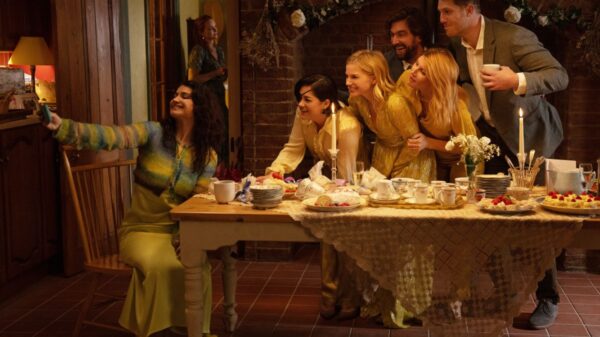To answer your question: no, it does not.
Though this retrofuturistic comedy has plenty of unique charm, Hello Tomorrow! is all surface-level; the magic of the show is in its aesthetics, production designs, and unique high concept. But those things are not enough – they have never been enough – to carry an entire story.
A work of fiction – any work of fiction, at all – will succeed or fail based on the strength of its characters, and characters alone. This isn’t to say that production design and concept are important – they are – but, while good character writing can save a bad or boring setting (after all, look at how many beloved stories take place in the utterly boring realm we know as the “real world”), a cool sci-fi premise can never replace good character writing.
So, Hello Tomorrow! has bad characters?
Well, they’re not the worst characters ever. In fact, some of them are pretty good, particularly the son of lead character Jack Billings (Billy Crudup), Joey Shorter (Nicholas Podany). Podany’s character, caught between tending to his ailing mother and following his newfound mentor (who he doesn’t yet know is his father) is a compelling one; it’s the sort of acting job that makes you wonder why he wasn’t the main character.
But alas, we are stuck following his much less interesting father, Jack Billings. Jack is the worst of villains in this setting – and by that, we don’t mean he’s a serial killer or interstellar warlord.
He’s worse – he’s a timeshare salesman.
So, What Happens?
Through Hello Tomorrow!’s first (and only, as of this writing) season, we watch as this huckster goes around selling timeshares on the moon to people dreaming of a better life, all the while trying to explain why the rocket launch that’ll supposedly take them to the moon keeps getting delayed.
The problem with Jack as a lead character is not that he’s a villain. Villains have made wonderful protagonists in the past. However, generally the best villain protagonists let their evil be outlandish. We can root for Death Note’s Light Yagami, because he kills criminals with a magic notebook. We can root for Tony Soprano, because most of us have never interacted with the Mafia before. The key to a good villain protagonist – or even a likable villain, really – is that their evil is not something ordinary people have to deal with on a day-to-day basis.
Most of us will never deal with brutal-yet-stylish warlords, sophisticated art thieves, or magical vigilante serial killers; however, slimy salesmen and deadbeat dads are so mundanely real; and Jack Billings is both. What Hello Tomorrow! asks its audience to do is not only empathize with, but become invested in the journey of, someone whom its audience has seen – and disliked – many times in the past.
There are certainly bright spots to this retrofuturistic comedy, but our protagonist, rendered unsympathetic on premise alone, is not one of them, and for that reason Hello Tomorrow! is best left as it is.











